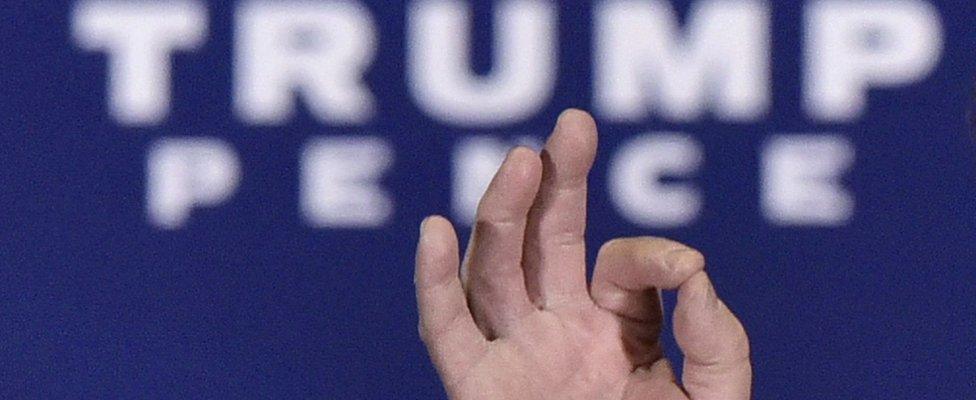US election: Trump outlines plan for first 100 days
- Published
Mr Trump criticised his accusers - and those who reported their comments
Donald Trump, lagging behind Hillary Clinton in polls, has outlined what he would do in his first 100 days were he to become US president.
With 17 days until the election, much of the recent focus has been on controversies linked to his campaign.
But in a speech in Gettysburg, Pennsylvania, he sought to highlight changes he would introduce.
Among them were restrictions on lobbyists and a renegotiation on trade and climate change deals.
Mrs Clinton and running mate Tim Kaine appeared at events on Saturday in Pennsylvania, a key battleground state in the race for the White House.
Mr Trump's advisers indicated before his speech that the measures announced would serve as the focus for the remaining two weeks of his campaign.
Among the key details he announced were:
restrictions on White House officials becoming lobbyists after they leave office;
term limits for members of Congress;
the cancellation of all payments to UN climate change programmes and the redeployment of those funds to fix US infrastructure;
the start of the process of "removing the more than two million criminal, illegal immigrants" - and the denial of visa-free travel to countries who refused to take back their citizens

Analysis - Anthony Zurcher, BBC News

So there you have it, Donald Trump's final pitch to the American people.
It was a mix of Republican boilerplate (Lower taxes! Less regulation!), anti-establishment populism (Axing trade deals! Extreme vetting of immigrants!) and the kind of off-message asides that have bedevilled his candidacy (I'm going to sue all my sexual harassment accusers!)
It wasn't exactly the Gettysburg Address, but it did have some lines that could have been the foundation of a compelling outsider campaign.
"I am asking the American people to rise above the noise and the clutter of our broken politics, and to embrace that great faith and optimism that has always been the central ingredient in the American character," Mr Trump said. "I am asking you to dream big."
Americans love big dreams and candidates who, in Abraham Lincoln's words, appeal to the "better angels of our nature".
With just over two weeks left before election day, however, it is probably much too late for Mr Trump to make "faith and optimism" the focus of a campaign that has often been typified by darkness and anger.

The speech was one of the most detailed by Mr Trump during his candidacy, and also touched on matters of security, economy and trade.
He said the country was facing a "fork in the road" over its future.
Donald Trump's suburban woman problem
While some polls have shown he has eaten into Mrs Clinton's lead over the past week, after the third presidential debate, she is still leading him in a number of the key swing states.
Before his speech, Mr Trump again attacked leading media outlets and suggested they were biased against him.
He vowed to break up media conglomerates, saying he would scrap the rumoured purchase of the Time Warner company, the owner of CNN, by AT&T. However, those comments were made outside of his main speech, and it was not clear if they were being put forward as policy.
Mr Trump also said he would sue every woman who has accused him of sexual assault or inappropriate behaviour as soon as his presidential campaign was over.
Ten women have come forward to accuse him of inappropriate behaviour, in the weeks after a video emerged of him boasting of groping women and kissing them.
"Every woman lied when they came forward to hurt my campaign," he told the audience in Gettysburg.
He said the media was fabricating stories to make him "look as bad and dangerous as possible".

What happens next?
The two candidates will spend the remaining 17 days before the election criss-crossing the US in their bid to persuade undecided voters. Expect to see lots of appearances in battleground states such as Ohio, North Carolina, Florida and Pennsylvania
Voters will go to the polls on Tuesday 8 November to decide who becomes the 45th president of the US
The new president will be inaugurated on 20 January 2017
More on the US election
Election 2016: The race for battleground states

